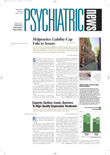Branched-chain amino acids (BCAA) may reduce symptoms of tardive dyskinesia in patients taking antipsychotic medications by an average of 36.5 percent, compared with placebo.
In a double-blind, placebo-controlled trial reported in the June issue of the American Journal of Psychiatry, the improvements seen in patients treated with BCAA were noted after the first week of treatment, sustained throughout the three-week duration of the trial, and highly statistically significant. Patients who received placebo experienced a nonstatistically significant worsening of the abnormal-movement patterns associated with tardive dyskinesia (TD).
“Patients using the product experienced significant improvement with minimal side effects,” said Mary Ann Richardson, Ph.D., principal investigator of the study and director of the Movement Disorders and Molecular Psychiatry Division of the Nathan S. Kline Institute for Psychiatric Research. Richardson is also a professor of psychiatry at New York University Medical School.
BCAA, sold under the brand name Tarvil in the United States, is classified as a medical food by the FDA. A medical food is defined as any food that is “formulated to be consumed orally or administered enterally under the supervision of a physician and [is] intended for the dietary management of a specific disease or condition that has nutritional requirements.”
The FDA does not regulate medical foods, but is in the process of proposing rules to do so. The only regulations currently in force are a ban on the sale of medical foods in general stores and supermarkets and a requirement that the label must clearly state “that the product is intended to be used to manage a specific medical disorder or condition.”
Tarvil is indicated “for the dietary management of tardive dyskinesia (TD) in males.” The indication also notes that TD is “an abnormal movement disorder that is secondary to the treatment of psychiatric disorders with antipsychotic medication.”
The product is formulated as a powder that when mixed with water forms a pineapple-flavored drink. It is usually given three times a day, with the dose titrated to patients’ body weight and specific medical condition.
Richardson and her colleagues observed TD movement patterns and frequency in patients through videotaped sessions at baseline, one week, two weeks, and the end point of three weeks. All videos were then reviewed by Richardson, who was blinded to which patient had been assigned BCAA or placebo, as well as which of the four recorded videos of each patient represented which timepoint within the study.
The total number of patients assigned to the two groups was 48. Of those, 36 (75 percent) completed the three-week trial. On an intention-to-treat analysis with last observation carried forward, 41 patients who completed at least the first week of the trial were included in the final data analysis.
For the primary outcome measure—the percent of change in tardive dyskinesia movements—a significant decrease was found at three weeks between patients taking BCAA (a 36.5 percent reduction in TD movements) and those receiving placebo (3.4 percent increase in TD movements).
No changes were noted in blood levels of the antipsychotic medications, nor were any significant changes seen in levels of blood glucose. No significant differences appeared between patients receiving BCAA and placebo for overall physical examination, complete blood count, blood chemistry profiles, or urinalysis screens.
The only side effects noted were transient gastrointestinal distress following dosing.
Blood levels of BCAA directly correlated with dosing, and in patients receiving BCAA, improvements noted at week one predicted improvement at both week two and week three.
The range of response within the group taking BCAA varied significantly, from a 60 percent or greater reduction in TD movements in more than one-third of the group to little or no change in TD movements. However, only one patient taking BCAA experienced an increase in TD movements on the medical food.
“The magnitude of the clinical response on a subject-by-subject basis in the [BCAA] group. . .demonstrates the strong clinical efficacy of the amino acids in treatment in a majority of patients,” Richardson and her colleagues pointed out. “These findings also reflect the heterogeneity of tardive dyskinesia and serve as a reminder that no one treatment is appropriate for all patients.”
The report stressed that the results apply only to the use of BCAA in men. There is limited evidence to suggest that the mechanism of antipsychotic-induced TD may be different in women.
Am J Psychiatry 2003 160 1117
